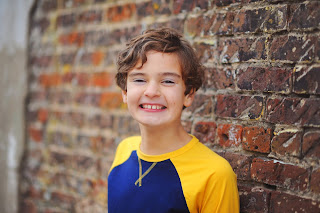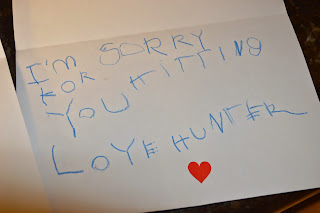Why NOT us?
We recevied so much information from the team that the best way to share it all was through email- here is the information we sent to our family...
December 22, 2011: We met with the Autism Team this morning for the transdisciplinary assessment (Psychologist, Psychiatrist, OT, SLP). We had previously met with the same psychologist, Dr. Alexis, two weeks ago for an almost 3-hour interview. We provided her with teacher checklists, parent checklists, and sleep information. She recommended that we come back on the 22nd for the full assessment while she had her team present.
Dr. Alexis started our review today by stating that there is a common theme of targeted tasks with Hunter: He can do it, but it is less than you would expect.
SOCIAL INTERACTION: Dr. Alexis felt eye contact, getting and maintaining attention (showing things to mom), and ability to share excitement were all strengths. Their concerns surrounded the modifications they had to make in presentation in order to keep Hunter's attention. What appears to be inattention at school, or difficulty to capture his attention (needing significant or forceful attempts) fall into the subcategory of lack of social or emotional reciprocity. They were also concerned with the second DSM-4 diagnostic criteria, the failure to develop peer relationships (according to parent and teacher report).
REPETITIVE AND STEREOTYPED PATTERNS OF BEHAVIOR: Strengths included parent report of pretend play at home with family and sister, and no repetitive type behaviors (your OCD type things like touching the door handle so many times before leaving, always needing the same chair, same spoon, etc). The areas of weakness for Hunter included getting stuck on objects too long- he didn't play with a variety of toys for an extended period of time. He did not demonstrate any pretend play during the testing situation despite multiple attempts by the facilitator. He has reported difficulty with transitioning activities, and he hand flaps in excitement (which she feels is part of his sensory component).
In summary...the team (led by Dr. Alexis) determined that Hunter does not meet qualification for Autistic Disorder (299.00). He is milder in presentation than the criteria deems necessary to meet the diagnosis- she felt the Autistic Disorder was too aggressive of a diagnosis. However, she did feel that he met the criteria for PDD-NOS (Pervasive Developmental Disorder, Not Otherwise Specified) (299.80). In the DSM-4, it states that this "category is used when there is a severe and pervasive impairment in the development of social reciprocal interaction or verbal and nonverbal communication skills, or when stereotyped behavior, interests, and activities are present, but the criteria are not met for a specific pervasive developmental disorder." For those of you not familiar with the terminology, Autism is a general term to describe a group of complex developmental brain disorders known as Pervasive Developmental Disorders (PDD). The other pervasive developmental disorders are PDD-NOS, Autistic Disorder, Aspergers, Rett Syndrome, and Childhood Disintegrative Disorder. Most professionals refer to it as Autism Spectrum Disorders, since there is such a wide range of severity. Hunter also has the sensory component, so Sensory Integration Disorder is also an appropriate diagnosis. The loud noises, the tags in shirts, being wet, crowded rooms, bright lights...so many sensory components make it difficult for Hunter to adapt to certain situations.
Dr. Alexis was highly complimentary of the work we have done with Hunter thus far and encouraged us to continue the use of picture schedules, behavior modifications, and his "sensory diet." She felt that school is hard for him b/c of the fact that learning is a social process-- the area that he struggles with the most, due to his disability. Very hard to type that word "disability", but in our minds, it only means that we need to find the tools he needs to make it an "ability." She didn't think that there were any behavior problems that fell outside of the Autism bubble (ex. aggression, etc).
Her recommendations were as follows:
1) Start ABA therapy ( Applied Behavior Analysis)- they will work to reinforce the back and forth (reciprocity), develop play skills, initiate conversation. There is a program at their facility that they recommend- however, it is an intensive program- 2- three hour sessions per week. Dr. Alexis has seen the most results from this program so we are going to try and make this happen. There is currently a wait list to start.
2) Continue preschool. Dr. Alexis wanted us to meet with the preschool teacher and director to determine if he is functioning successfully, b/c she felt a school with typical peers would best suit his needs.
3) Evaluation by the school district to consider supplemental therapy (OT, in home training).
To clarify the meaning of Autism...it's a developmental neurological disorder that impacts the functioning and development of the brain. If you think of an umbrella, PDD (pervasive developmental disorders) is at the top. Coming down are the five sub-categories: Autistic Disorder, PDD-NOS (what Hunter was diagnosed with), Aspergers, and two others. Hunter's diagnosis, PDD-NOS stands for Pervasive Developmental Disorders NOT OTHERWISE SPECIFIED...in other words, not significant enough or doesn't meet all the criteria. It is an overall delay of communication and social skills (talking to other kids, starting conversations, etc) that doesn't fit another category and doesn't have a known cause.
To clarify the meaning of Autism...it's a developmental neurological disorder that impacts the functioning and development of the brain. If you think of an umbrella, PDD (pervasive developmental disorders) is at the top. Coming down are the five sub-categories: Autistic Disorder, PDD-NOS (what Hunter was diagnosed with), Aspergers, and two others. Hunter's diagnosis, PDD-NOS stands for Pervasive Developmental Disorders NOT OTHERWISE SPECIFIED...in other words, not significant enough or doesn't meet all the criteria. It is an overall delay of communication and social skills (talking to other kids, starting conversations, etc) that doesn't fit another category and doesn't have a known cause.
You'll also hear the term, "Autistic Spectrum Disorders"- since the signs and symptoms vary so greatly from person to person, they call it a spectrum. These disorders are included under PDD. So basically, PDD and Autism are used interchangably even though it is not exactly accurate to do so.
Just wanted to share a couple of other facts when I was doing reserach for a presentation I gave to a preschool a couple of months ago.
-The national average is that 1 in 110 children have Autism.
-Boys are 4-5 times more likely than girls to have Autism.
-Recent studies have estimated that the lifetime cost to care for an individual with ASD (Autism Spectrum Disorder) is $3.2 million dollars
-THe median age of earliest diagnosis is between 4.5 and 5.5 years, but for 51-91 percent of chidlren with ASD, developmental concerns had been recorded before three years of age.
SO...a question in our minds for the past year and a half is now answered. However, the only question that remains and will remain unknown is the cause. The vast majority of cases of autism are idiopathic- we just don't know the cause. There is evidence to indicate that there could be a predisposition, or susceptibility related to specific genes. Research has also shown that environmental factors, such as viruses, may also play a role in causing autism. In our mind, we still believe that Hunter had completely normal development until encountering a strep infection, antiobiotic reaction, and steroid combination that resulted in a viral tic. After this series of events, his little brain has not been quite the same. Even though this occurred at the "magical age" for Autism symptoms to magnify, he had no signs prior to this infection and never experienced regression, in any area. The psychiatrist was very much in agreement that viruses can be the cause of this type of neurological insult (you can google PANDAS to read more about strep infections and the brain).
Peter and I are both fighters...on the way home, Peter said, "We both like challenges- so this is our chance to defeat it." Although there is no cure for Autism, our goal is to have him mainstreamed by the time he starts kindergarten in 2 1/2 years. We have a long road ahead of us that will be filled with multiple challenges, but we have already seen growth and are going to continue to love our little boy just the same as we did before receiving this diagnosis. We appreciate all of your support, love, and understanding with our sweet Hunter. "Every good and perfect gift is from above." James 1:17.
Love always,
Erika and Peter
PS- I forgot to say (and I think we have told you this before), but we went through a period of time where we asked ourselves, "why us?" You think about the struggles, the time, the energy...and then you think about Hunter and you say, "Why not us?" We are going to give this diagnosis a fierce run for its money. :)


Comments
Post a Comment